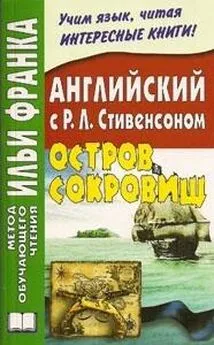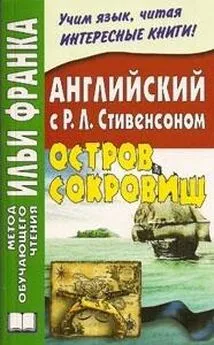Илья Франк - Английский язык с Р.Л. Стивенсоном. Остров сокровищ
- Название:Английский язык с Р.Л. Стивенсоном. Остров сокровищ
- Автор:
- Жанр:
- Издательство:неизвестно
- Год:неизвестен
- ISBN:нет данных
- Рейтинг:
- Избранное:Добавить в избранное
-
Отзывы:
-
Ваша оценка:
Илья Франк - Английский язык с Р.Л. Стивенсоном. Остров сокровищ краткое содержание
Английский язык с Р.Л. Стивенсоном. Остров сокровищ - читать онлайн бесплатно ознакомительный отрывок
Интервал:
Закладка:
away — увлечь, увести; mess — аморальный, невежественный, спутанный )?
not you (не ты = ты не можешь быть заодно с ними)! As sure as God sees me
(верно, как Господь видит меня), I'd sooner lose my hand (я скорее лишился бы
руки = дам руку на отсечение). If I turn agin my dooty — — (чем изменю
Мультиязыковой проект Ильи Франка www.franklang.ru
305
своему долгу…; agin = against; to turn against — восстать, обратиться
против )'
2. And then all of a sudden he was interrupted by a noise (затем внезапно он был
прерван шумам). I had found one of the honest hands (я нашел одного из
честных матросов) — well, here, at that same moment, came news of another (и
вот тут, в тот же самый момент, пришла весть о другом /таком же/). Far away
out in the marsh there arose, all of a sudden, a sound like the cry of anger (далеко
за болотом раздался неожиданно звук, похожий на крик ярости = гневный
крик; to arise — возникать, доноситься, явиться ), then another on the back of
it (затем другой /крик/ последовал за ним: «на спине»); and then one horrid,
long-drawn scream (а потом — ужасный продолжительный вопль). The rocks
of the Spy-glass re-echoed it a score of times (скалы Подзорной Трубы
повторили его много раз); the whole troop of marsh-birds rose again, darkening
heaven (вся стая болотных птиц поднялась вновь, затмевая небо; to darken —
затемнять, заслонять ), with a simultaneous whirr (с одновременным шумом
/крыльев/); and long after that death yell was still ringing in my brain (и долго
потом еще тот предсмертный крик звучал в моем мозгу = стоял в ушах),
silence had re-established its empire (/хотя/ тишина восстановила свое царствие
= вновь воцарилось безмолвие), and only the rustle of the redescending birds and
the boom of the distant surges disturbed the languor of the afternoon (и лишь
шорох /крыльев/ вновь опускающихся птиц и гул дальних волн нарушали
тишины вечера; to descend — спускаться, сходить; languor — слабость,
апатичность, неподвижность ).
hoarse [hLs] taut [tLt] simultaneous [sImql`teInIqs] whirr [wq:] languor
[`lxNgq]
Мультиязыковой проект Ильи Франка www.franklang.ru
306
1. 'Silver,' said the other man — and I observed he was not only red in the
face, but spoke as hoarse as a crow, and his voice shook, too, like a taut rope
— Silver,' says he, 'you're old, and you're honest, or has the name for it; and
you've money, too, which lots of poor sailors hasn't; and you're brave, or I'm
mistook. And will you tell me you'll let yourself be led away with that kind of
a mess of swabs? not you! As sure as God sees me, I'd sooner lose my hand. If
I turn agin my dooty — — '
2. And then all of a sudden he was interrupted by a noise. I had found one of
the honest hands — well, here, at that same moment, came news of another.
Far away out in the marsh there arose, all of a sudden, a sound like the cry of
anger, then another on the back of it; and then one horrid, long-drawn
scream. The rocks of the Spy-glass re-echoed it a score of times; the whole
troop of marsh-birds rose again, darkening heaven, with a simultaneous
whirr; and long after that death yell was still ringing in my brain, silence had
re-established its empire, and only the rustle of the redescending birds and the
boom of the distant surges disturbed the languor of the afternoon.
1. Tom had leaped at the sound, like a horse at the spur (том подскочил при этом
звуке, как лошадь пол шпорой); but Silver had not winked an eye (но Сильвер и
глазом не моргнул). He stood where he was (он стоял, где был = на месте),
resting lightly on his crutch (опираясь слегка на костыль), watching his
companion like a snake about to spring (и глядя на своего собеседника, как
змея, готовая ужалить; to spring — броситься, прыгнуть ).
2. 'John!' said the sailor, stretching out his hand (сказал матрос, протягивая
руку).
3. 'Hands off (руки прочь)!' cried Silver, leaping back a yard (вскрикнул
Сильвер, отпрыгивая на ярд), as it seemed to me, with the speed and security of a
Мультиязыковой проект Ильи Франка www.franklang.ru
307
trained gymnast (как мне показалось, со скоростью и уверенностью
тренированного гимнаста).
4. 'Hands off, if you like, John Silver (/я уберу/ руки прочь, если хочешь, Джон
Сильвер),' said the other (сказал тот). 'It's a black conscience that can make you
feared of me (это черная совесть может заставить тебя бояться меня). But, in
heaven's name, tell me what was that (но, умоляю тебя: «именем небес», скажи
мне, что это было)?'
leaped [lJpt] security [sI`kjuqrItI] gymnast [`GImnxst] conscience [`kOnSqns]
heaven [`hevn]
1. Tom had leaped at the sound, like a horse at the spur; but Silver had not
winked an eye. He stood where he was, resting lightly on his crutch, watching
his companion like a snake about to spring.
2. 'John!' said the sailor, stretching out his hand.
3. 'Hands off!' cried Silver, leaping back a yard, as it seemed to me, with the
speed and security of a trained gymnast.
4. 'Hands off, if you like, John Silver,' said the other. 'It's a black conscience
that can make you feared of me. But, in heaven's name, tell me what was
that?'
1. 'That (это)?' returned Silver, smiling away, but warier than ever (ответил
Сильвер, улыбнувшись, но осторожнее = не так широко, как всегда), his eye a
mere pin-point in his big face (его глаз /стал/ маленьким, словно острие
булавки на его огромном лице = глаза его сузились; mere — всего лишь, не
Мультиязыковой проект Ильи Франка www.franklang.ru
308
более чем ), but gleaming like a crumb of glass (но сверкали, как стеклышки:
«кусочки стекла»). 'That? Oh, I reckon that'll be Alan (это? По-моему, это Алан;
to reckon — считать, полагать ).'
2. And at this poor Tom flashed out like a hero (на это Том отреагировал как
герой = принял весть с отвагой; to flash out — вспылить, вспыхнуть ).
3. 'Alan (Алан)!' he cried (воскликнул он). 'Then rest his soul for a true seaman
(да упокоится душа этого настоящего моряка = мир праху его)! And as for
you, John Silver (а что касается тебя, Джон Сильвер), long you've been a mate
of mine, but you're mate of mine no more (ты долго был моим товарищем, но
больше ты мне не товарищ). If I die like a dog, I'll die in my dooty (если =
пускай я умру, как собака, /но/ я умру в своем долге = не нарушу своего
долга; dooty = duty ). You've killed Alan, have you (/ведь/ вы убили Алана, да)?
Kill me too, if you can (убейте меня тоже, если можете). But I defies you (но я
плюю на вас; to defy — пренебрегать, бросать вызов ).'
crumb [krAm] glass [glRs] hero [`hIqrqu] defies [dI`faIz]
1. 'That?' returned Silver, smiling away, but warier than ever, his eye a mere
pin-point in his big face, but gleaming like a crumb of glass. 'That? Oh, I
reckon that'll be Alan.'
2. And at this poor Tom flashed out like a hero.
3. 'Alan!' he cried. 'Then rest his soul for a true seaman! And as for you, John
Silver, long you've been a mate of mine, but you're mate of mine no more. If I
die like a dog, I'll die in my dooty. You've killed Alan, have you? Kill me too,
if you can. But I defies you.'
Мультиязыковой проект Ильи Франка www.franklang.ru
309
1. And with that (и с этими /словами/), this brave fellow turned his back directly
on the cook (этот храбрый парень повернул свою спину = повернулся тотчас к
коку спиной), and set off walking for the beach (и зашагал к берегу; to set off —
отправиться /в путь/, начать ). But he was not destined to go far (но ему не
суждено было уйти далеко; to destine — предопределять, предполагать ).
With a cry, John seized the branch of a tree (с криком = крикнув, Джон
схватился за ветку дерева), whipped the crutch out of his armpit (выхватил
костыль из-под мышки), and sent that uncouth missile hurtling through the air (и
метнул этот неуклюжий снаряд, просвистевший в воздухе; uncouth —
странный, неотесанный; missile — ракета, метательный снаряд; to hurtle —
мчаться со свистом, громыхать ). It struck poor Tom point foremost (он
ударил бедного Тома острым наконечником; point — острие, наконечник;
Читать дальшеИнтервал:
Закладка:


